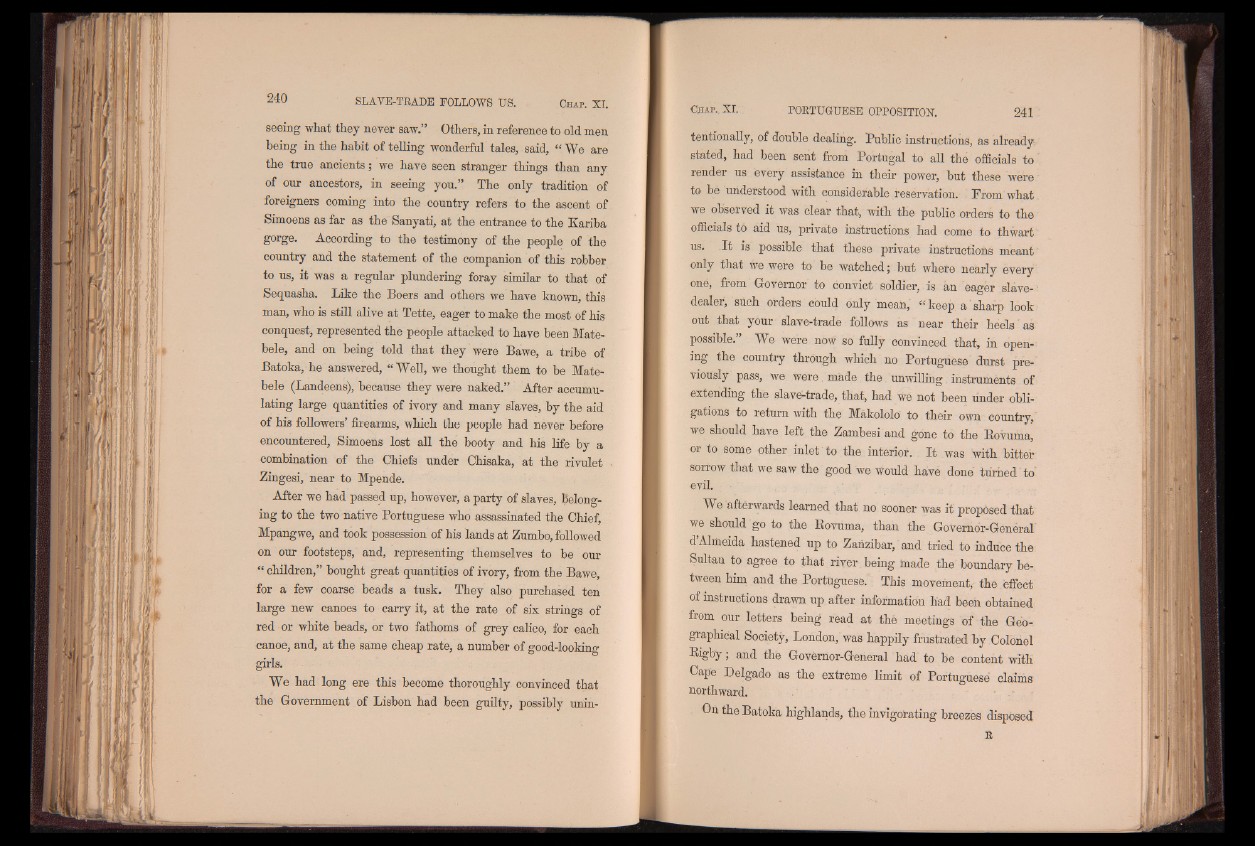
seeing what they never saw.” Others, in reference to old men
being in the habit of telling wonderful tales, said, “ We are
the true ancients; we have seen stranger things than any
of our ancestors, in seeing you.” The only tradition of
foreigners coming into the country refers to the ascent of
Simoens as far as the Sanyati, at the entrance to the Kariba
gorge. According to the testimony of the people of the
country and the statement of the companion of this robber
to us, it was a regular plundering foray similar to that of
Sequasha. Like the Boers and others we have known, this
man, who is still alive at Tette, eager to make the most of his
conquest, represented the people attacked to have been Mate-
bele, and on being told that they were Bawe, a tribe of
Batoka, he answered, “Well, we thought them to be Mate-
bele (Landeens), because they were naked.” After accumulating
large quantities of ivory and many slaves, by the aid
of his followers’ firearms, which the people had never before
encountered, Simoens lost all the booty and his life by a
combination of the Chiefs under Chisaka, at the rivulet
Zingesi, near to Mpende.
After we had passed up, however, a party of slaves, Belonging
to the two native Portuguese who assassinated the Chief,
Mpangwe, and took possession of his lands at Zumbo, followed
on our footsteps, and, representing themselves to be our
“ children,” bought great quantities of ivory, from the Bawe,
for a few coarse beads a tusk. They also purchased ten
large new canoes to carry it, at the rate of six strings of
red or white beads, or two fathoms of grey calico, for each
canoe, and, at the same cheap rate, a number of good-looking
girls.
We had long ere this become thoroughly convinced that
the Government of Lisbon had been guilty, possibly unintentionally,
of double dealing. Public instructions, as already
stated, had been sent from Portugal to all the officials to
render us every assistance in their power, but these were
to be understood with considerable reservation. From what
we observed it was clear that, with the public orders to the
officials to aid us, private instructions had come to thwart
us. ,It is possible that these private instructioiis meant
only that we were to be watched; but where nearly every
oné, from Governor to convict soldier, is àn eager slàve-
dealer, such orders could only mean, “ keep a'sharp look
out that your slave-trade follows as near their heels as
possible.” We were now so fully convinced that, in opening
the country through which no Portuguese durst previously
pass, we were, made the unwilling instruments of
extending the slave-trade, that, had we not been under obligations
to return with the Mâkololo to their own country,
we should have left the Zambesi and gone to the Rovuma,
or to some other inlet to the interior. I t was with bitter
sorrow that we saw the good we would havé done turned to
evil.
We afterwards learned that no sooner was it proposed that
we should go to the Rovuma, than the Governor-General
d Almeida hastened up to Zanzibar, and tried to induce the
Sultan to agree to that river being made the boundary between
him and the Portuguese. This movement, the effect
of instructions drawn up after information had been obtained
from our letters being read at the meetings of the Geographical
Society, London, was happily frustrated by Colonel
Rigby ; and the Govèrnor-General had to be content with
Cape Delgado as the extrême limit of Portuguese claims
northward.
On the Batoka highlands, the invigorating breezes disposed
R